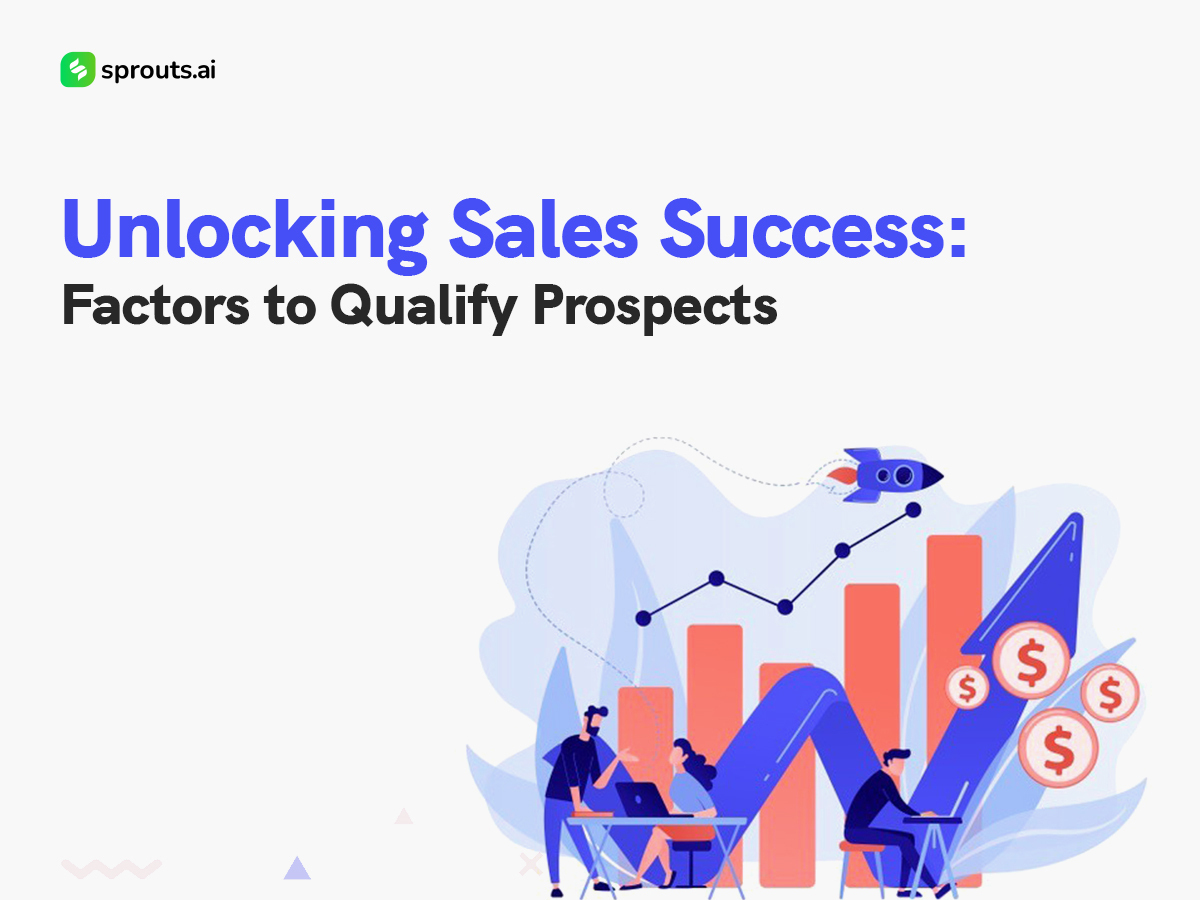Spotting great sales leads isn’t a guessing game. Qualifying prospects helps you focus your efforts on those most likely to buy, saving you time and boosting sales. This blog explores 15 key factors for qualifying prospects, along with a proven process to guide you.
Understanding Sales Qualification
Sales qualification is the pivotal process of evaluating whether a prospect possesses the potential to evolve into a valuable customer. It entails a comprehensive assessment of various aspects of a prospect’s profile to ascertain alignment with the offerings of your product or service.
The 15 Key Factors
- Need: Qualifying prospects begins with identifying whether they have a genuine need that your product or service can address. Understanding their pain points, challenges, and objectives enables you to tailor your approach to resonate with their specific requirements, fostering genuine interest and driving eventual conversion.
- Budget: An integral aspect of qualification involves ensuring that the prospect possesses the financial means to invest in your offering. Early discussions about budget constraints not only filter out leads that may not be financially viable but also enable you to tailor your solution to fit within their budgetary parameters, increasing the likelihood of a successful sale.
- Authority: Determining whether the contact person holds decision-making authority is pivotal. Engaging with key decision-makers streamlines the sales process, expedites decision-making, and reduces unnecessary delays associated with navigating through hierarchical layers within the prospect’s organization.
- Timing: Aligning with the prospect’s timeline for making a purchase is essential for effective qualification. Assessing whether the timing coincides with your sales cycle enables you to prioritize leads and allocate resources efficiently, ensuring that efforts are focused on prospects who are ready to proceed.
- Size: Consideration of the potential deal size is imperative for strategic qualification. Evaluating whether the effort required to close the sale aligns with the anticipated returns enables you to prioritize prospects based on their potential value, optimizing resource allocation and maximizing sales outcomes.
- Compatibility: Assessing the compatibility of your product or service with the prospect’s existing systems, processes, and infrastructure is essential. Demonstrating seamless integration and compatibility enhances the perceived value of your offering, alleviates concerns, and increases the likelihood of conversion.
- Urgency: Gauging the prospect’s urgency to address their needs is crucial for qualifying high-priority leads. A heightened sense of urgency often indicates a greater readiness to make a purchase, accelerating decision-making and expediting the sales process for faster conversions.
- Industry: Evaluation of whether the prospect’s industry aligns with your target market provides valuable insights for effective qualification. Selling within familiar industries facilitates understanding and communication, enabling you to tailor your approach to resonate with industry-specific needs and challenges.
- Location: Considering geographical factors such as shipping costs, logistics, and service availability is pivotal for qualification. Understanding and addressing potential barriers associated with the prospect’s location enables you to proactively mitigate concerns and streamline the sales process, ensuring a seamless experience for the prospect.
- Competition: Awareness of competitors the prospect is considering offers valuable strategic insights for effective qualification. Tailoring your sales pitch to highlight unique selling propositions, address competitive advantages, and differentiate your offering enhances its perceived value and increases the likelihood of winning the deal.
- Pain Points: Identifying and addressing the prospect’s pain points is essential for establishing rapport and building a compelling value proposition. Understanding their challenges, objectives, and priorities enables you to position your offering as a solution that addresses their specific needs, fostering resonance and facilitating conversion.
- Benefits: Emphasizing the benefits of your product or service over mere features is paramount for effective qualification. Communicating how your offering delivers tangible value, addresses specific pain points, and aligns with the prospect’s objectives enhances its perceived value and resonates more effectively with prospects, driving conversion.
- Cultural Fit: Ensuring alignment between your company culture and that of the prospect is critical for fostering trust and building long-term relationships. Establishing rapport based on shared values, principles, and organizational culture enhances credibility, strengthens the foundation for collaboration, and increases the likelihood of conversion.
- Expectations: Clarifying the prospect’s expectations regarding your product or service is essential for effective qualification. Aligning deliverables, timelines, and outcomes with their anticipated expectations mitigates misunderstandings, builds trust, and enhances satisfaction post-sale, laying the groundwork for successful long-term partnerships.
- Past Purchases: Analyzing the prospect’s past buying behavior provides valuable insights into their preferences, decision-making patterns, and propensity to purchase. Leveraging this information enables you to personalize your approach, tailor solutions to meet their specific needs, and anticipate potential objections, increasing the likelihood of conversion and fostering customer loyalty.
A Proven Sales Qualification Process
Implementing a structured sales qualification process significantly enhances conversion rates and sales efficiency. The BANT framework, which evaluates prospects based on Budget, Authority, Need, and Timing, offers a systematic approach to prioritizing leads and optimizing sales efforts for maximum effectiveness.
Qualifying prospects effectively requires a strategic approach, meticulous attention to detail, and a thorough understanding of their unique needs and preferences. By incorporating the key factors outlined above and embracing proven sales qualification methodologies, sales professionals can achieve unparalleled success and efficiency in their endeavors. Continued learning, adaptation, and collaboration with industry experts further refine sales techniques, ensuring sustained competitive advantage and long-term growth.

